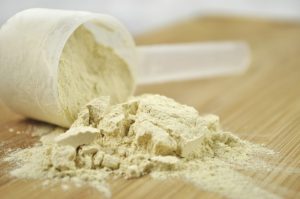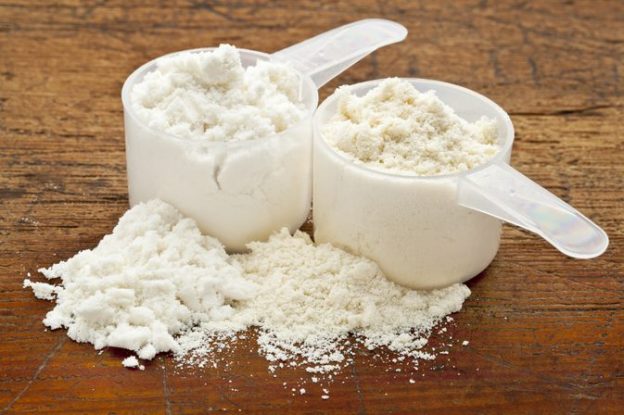Even though the overwhelming majority of whey protein options on the market today get lumped into the “protein powder” category, the truth of the matter is there are major differences between each individual type of whey protein available – differences that will have a dramatic impact on how they help you build lean muscle mass, improve your strength and endurance, and achieve the fitness and nutrition goals you set for yourself.
Below we break down the major differences between whey protein isolate and the other options available on the market today.
Is Whey Protein Powder That Important?
Right out of the gate, it’s important to clear up any myth or misconception you may have heard about the value of whey protein powder.

There are plenty of folks out there in the fitness community (including folks that should know better) that want to somehow disparage or discount the beneficial impact whey protein has on the human body, particularly those that are lifting heavy and pushing their bodies to the limit.
These people want you to believe that you can get all of your protein from whole food sources (like lean meat, for example). What they don’t tell you is that you have to spend a small fortune on those whole food sources of protein if you ever wanted to get close to what a couple of scoops of quality whey protein isolate brings to the table.
With the help of the right whey protein isolate powder you’re going to be able to:
- Flood your body with the ultimate building block of new lean muscle mass
- Cut down on the amount of calories your pushing into your body at the same time, reducing the chances that it’s turned into fat rather than muscle
- Increase your overall strength, endurance, and athletic capacity almost overnight
Is There Any Real Difference Between Whey Protein Isolate And Other Options?
The two major categories of whey protein available on the market today are whey protein isolate and whey protein concentrate.
While similar in structure (and almost always marketed and advertised as interchangeable), the reality of the situation is that whey protein isolate his head and shoulders above and beyond whey protein concentrate and should always be taken advantage of instead of whey protein concentrate whenever possible.
Whey protein isolates, you see, contain approximately 90% protein in each and every single scoop of these powders.
Whey protein concentrates, on the other hand, can contain anywhere from 25% protein to 89% protein – almost always leaning towards the lower end of this scale to cut costs, cut corners, and inevitably short change your results.
Bioavailability Differences
Whey protein isolate is almost always manufactured in a way that makes it highly bioavailable compared to whey protein concentrates.
This is really just a fancy way of saying that your body is going to be able to absorb whey protein isolate into your bloodstream at a faster pace than concentrate. This means that your muscles that need protein are going to get the fuel they require faster, helping you to build muscle quicker but also helping you to recover from heavy workouts much sooner as well.
A lot less of the protein you consume in the form of whey protein isolate is going to be flushed out of the body as waste, too, thanks to its high bioavailability.
Protein Percentage Differences
As we highlighted above, the major difference between whey protein isolate and whey protein concentrate comes in the form of protein percentage differences.
With isolate you know beyond a shadow of a doubt that you’re always getting at least 90% protein in every single scoop. With concentrate you’ll never know exactly how much you are getting, as it can sit anywhere between 25% and 89% protein in every scoop.
Fat, Carb, and Lactose Differences
On top of that, whey protein isolate also has a much lower total carbohydrate content compared to whey protein concentrate.
You’ll also find whey protein isolate to have a lower lactose content than whey protein concentrate, particularly useful for those that are sensitive to dairy, sensitive to lactose, or flat out lactose intolerant but still want to get all of the big benefits that whey protein has to offer.
Pricing Differences
On the flip side of things, whey protein isolate is (and understandably so) almost always more expensive than whey protein concentrate.
This has to do with all of the benefits we highlighted above, as well as the fact that the manufacturing process responsible for producing this high quality source of protein is quite a bit more involved compared to what’s necessary to produce whey protein concentrate.
Closing Thoughts
At the end of the day, any whey protein supplement (provided it’s from a high-quality manufacturer) is going to help you build a bigger, stronger, more athletic body faster than you would have been able to without a quality protein supplement helping you along the way.
Whey protein isolate is always the better choice (particularly since it includes branched chain amino acids – particularly leucine) and should be your go-to protein supplement when you are serious about building a fitter, healthier, and happier body.
Sources:
https://www.healthline.com/nutrition/whey-protein-isolate-vs-concentrate
https://www.livestrong.com/article/443290-whey-protein-vs-whey-isolate/
https://usa.inquirer.net/17982/what-is-whey-protein-the-ultimate-guide-to-whey-protein-powder







